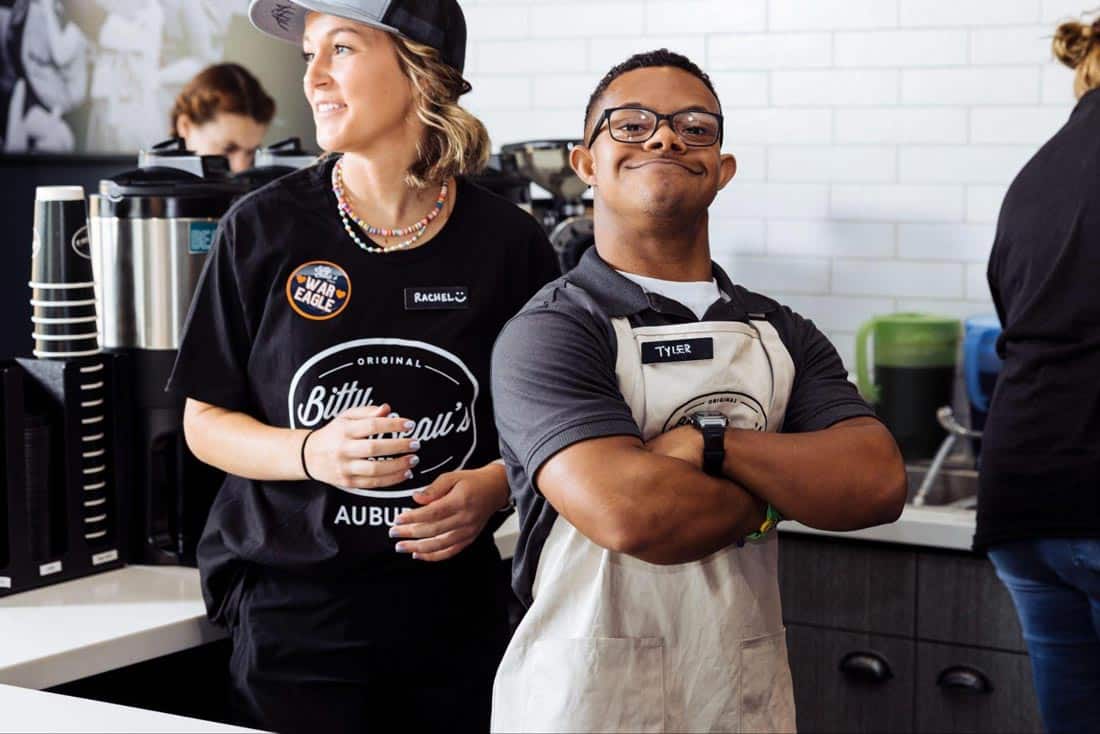If you ask Amy and Ben Wright, the co-founders of Bitty & Beau’s Coffee, what makes an organization special, they’ll say it’s the people—especially within the hospitality and beverage industries, which rely heavily on personal interaction to succeed. Whether it’s a warm greeting at the door, a friendly chat at the bar or attentive service at the table, meaningful exchanges play a significant role in highlighting businesses in these fields.
Amy and Ben Wright opened their first store in 2016 in Wilmington, North Carolina. Since then, the coffee franchise has expanded to 20 coffee shops across 11 states. The company employs over 400 people with disabilities and has amassed over 700,000 followers on their social media accounts.
The co-founders believe they’ve been successful in drawing people into their shops and expanding their brand due to two key factors—hiring the right people and improving the employee experience. They believe that improving the employee experience improves the customer experience, because they’ve seen that employees are more likely to provide superior service when they are content, satisfied and engaged with their work.
At Bitty & Beau’s Coffee, the Wrights have invested in creating a workplace culture where their employees can be coached on their strengths and made to feel empowered, valued and accepted. This has resulted in higher customer satisfaction and more repeat business in their experience.
“A lot of people will walk into our shops because they see coffee, but when they leave, they will have this transformative experience,” Ben Wright says. “Every shop has its regulars, but I would say a substantial portion are first-time [customers], allowing people to join this human rights movement disguised as a coffee shop.”
Amy and Ben Wright credit their team of inspiring individuals as what keeps customers coming back. The pair first became motivated to start Bitty & Beau’s Coffee in 2015 after learning that unemployment is staggeringly high among people with intellectual and developmental disabilities (IDD), even though they have the potential and skills to work in any formal industry. This pushed the co-founders to take small steps to change the numbers, so they could ensure that their kids—two of whom were born with Down syndrome and one with autism—would not have to become part of that statistic.
Believing that showing the worth they saw in their children’s lives and the lives of others with disabilities could be the solution, the Wrights created Bitty & Beau’s Coffee as a place where people with IDD could work and be valued. The co-founders claim that though there is an extreme need in the U.S. for this kind of employment, their chain is among just a handful of for-profit businesses trying to bridge this gap in society.
“What we are trying to do is hit critical mass with disabilities,” Ben Wright says. “As there is nobody in front of us to follow, we can’t open enough coffee shops to affect [unemployment] alone. But we can keep demonstrating what’s possible, so other people will join this movement.”
The Wrights say the employee experience that sets them apart is not about labeling the movement as a “charity.” For them, deploying real human and risk capital is the way forward, since they want people to start thinking more about prosperity—not more about charity—for people with IDD. The co-founders believe the business world, known as a space for innovation, is perfectly positioned to take the lead—and their coffee shops simply make the point that it can be done.
“We’ve learned that everybody learns differently,” Amy Wright says. “So you have to have a variety of ways to teach. I think it’s a matter of meeting people where they are for who they are. You might even have to make accommodations. But the reality is, employers make accommodations for typically developing people all the time, too.”
The co-founders say their radically inclusive model at Bitty & Beau’s Coffee provides jobs that can bring immeasurable value to those with disabilities, while motivating customers to embrace people with disabilities as part of their lives—a win-win for both the employee and customer experience.






